James Earl Jones, the famous actor known for his deep, powerful voice as Darth Vader in *Star Wars* and Mufasa in *The Lion King*, has died at 93.
Jones was considered one of the greatest actors of his time, with a career that covered everything from Shakespeare plays to major Hollywood movies. He was one of the few actors to win an Emmy, Grammy, Oscar, and Tony Award, showing his incredible talent.
His death was reported by *Deadline*, through his representatives at Independent Artist Group.

James Earl Jones was born on January 17, 1931, in Arkabutla, Mississippi, and grew up with his grandparents in Dublin, Michigan. Despite becoming one of the most famous voices in the world, he struggled with a stutter as a child.
“I couldn’t talk,” Jones shared in a 1996 interview. “My first year of school, I didn’t speak, and this continued until high school.” A teacher helped him overcome his stutter by encouraging him to read poetry out loud.
After serving in the US Army during the Korean War, Jones decided to follow his passion for acting. He studied at the American Theatre Wing, supporting himself by working as a janitor. By the 1960s, he was recognized as one of the great Shakespearean actors of his time, playing famous roles like Othello and King Lear. He also made his film debut in the 1964 Stanley Kubrick movie *Dr. Strangelove*, playing Lt. Lothar Zogg.
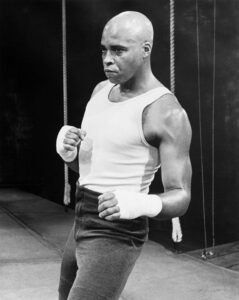
In 1967, James Earl Jones played a boxer in *The Great White Hope*, a role that earned him the Tony Award for Best Actor in a Play. He later played the same role in the 1970 movie version and received his first Oscar nomination for it.
While he had many great acting roles, Jones became most famous for one where he didn’t even appear on screen: the voice of Darth Vader in *Star Wars*. Though another actor, David Prowse, wore the costume, Jones provided the deep, powerful voice that made Darth Vader one of the most unforgettable characters in movie history.
James Earl Jones initially chose not to be credited for his role as Darth Vader, but it has become one of his most famous performances. He continued to voice Vader for many years, including in the sequels *The Empire Strikes Back* and *Return of the Jedi*, the prequel *Revenge of the Sith*, and the spin-off *Rogue One*. In 2022, Jones retired from voicing Vader but agreed to let his voice be used in future projects through artificial intelligence and old recordings.
Jones also voiced another beloved character, Mufasa, in Disney’s 1994 film *The Lion King*. He returned to voice Mufasa again in the 2019 remake.
In the 1980s and 1990s, James Earl Jones appeared in many popular movies like *Conan the Barbarian*, *Coming to America*, *Field of Dreams*, *The Hunt for Red October*, *Patriot Games*, and *The Sandlot*. He also won his second Tony Award for his role in the original production of August Wilson’s play *Fences*.
Jones received eight Emmy Award nominations for his TV work and won twice in 1991: once for Outstanding Supporting Actor in a Limited Series or Movie for *Heat Wave*, and once for Outstanding Lead Actor in a Drama Series for *Gabriel’s Fire*.
He also kept performing on Broadway, starring in revivals of plays such as *On Golden Pond*, *Cat on a Hot Tin Roof*, *Driving Miss Daisy*, *The Best Man*, and *You Can’t Take It With You* over the past 20 years.
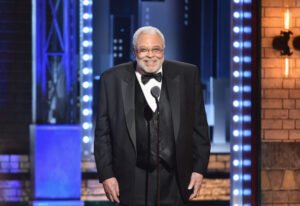
James Earl Jones received many awards and honors during his impressive career. In 2011, he was given an Honorary Academy Award, joining a special group of people who have won an Emmy, Grammy, Oscar, and Tony Award, known as “EGOT.” In 2022, Broadway’s Cort Theatre was renamed the James Earl Jones Theatre in his honor.
Rest in peace to the legendary James Earl Jones, one of the greatest actors of our time. Please share this story to remember him.
Voltei para casa mais cedo e encontrei minha filha e meu marido atrás de uma porta fechada – a revelação deles me chocou

Uma dor de cabeça terrível me fez ir para casa mais cedo, e eu esperava por uma tarde tranquila sozinha. Mas ver minha filha, que deveria estar na escola, e seu padrasto atrás daquela porta fechada me abalou profundamente. O que descobri partiu meu coração em dois e me deixou em lágrimas.
“Mãe, eu simplesmente não consigo me dar bem com o Mike! Eu tenho meus motivos, ok?” minha filha Lily costumava dizer sempre que eu mencionava o padrasto dela. Isso doía. Essa cena se repetiu inúmeras vezes nos últimos quatro anos, desde que me casei com o Mike. Minha filha de 12 anos, geralmente tão doce e alegre, se transformava em uma pessoa completamente diferente perto do padrasto. 💔
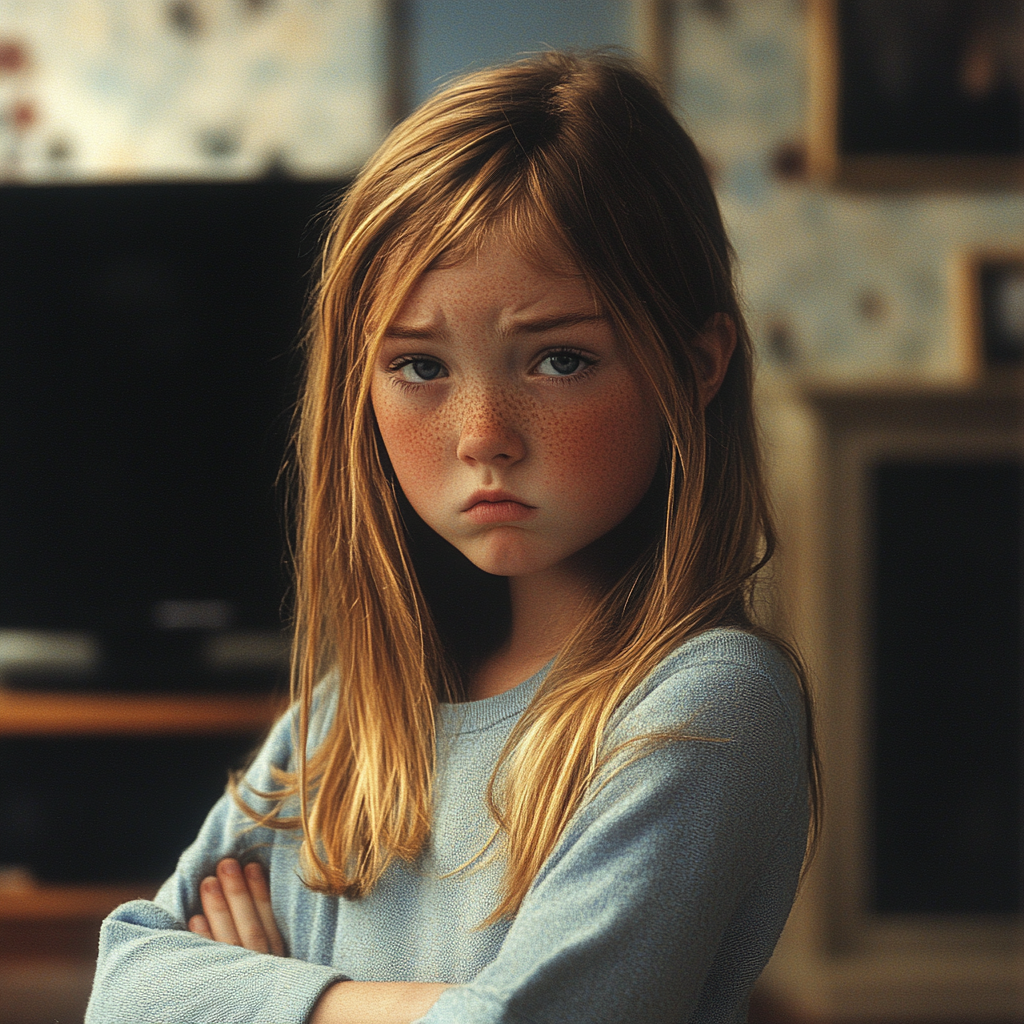
Uma jovem garota furiosa | Fonte: Midjourney
Eu observava impotente enquanto os olhos de Lily endureciam, suas pequenas mãos se fechando em punhos ao lado do corpo. A transformação foi tão rápida quanto dolorosa de testemunhar.
“Querida, por favor”, eu implorava, estendendo a mão para ela. “Mike te ama. Ele está se esforçando tanto…”
Mas Lily sempre me cortava, sua voz tremendo de raiva e algo mais que eu não conseguia identificar. Era mágoa? Medo? Eu não entendia o que era então.

Uma mulher angustiada sentada no sofá | Fonte: Midjourney
“Você não entende, mãe! Você nunca vai entender!” ela gritava.
E com isso, ela saía furiosa para o quarto, me deixando no corredor, com o coração pesado de preocupação e frustração.
“Dê tempo a ela”, todos disseram. “Famílias misturadas são difíceis.”
Conforme os meses se transformavam em anos, comecei a me perguntar se Lily aceitaria Mike como parte da nossa família. Cada tentativa que ele fazia de se conectar com ela era recebida com ombros frios ou explosões de raiva.

Um homem chateado segurando a cabeça | Fonte: Midjourney
Meu coração doeu pelos dois — por Lily, que parecia carregar um fardo que eu não conseguia entender, e por Mike, que se esforçou tanto para ser uma boa figura paterna.
Eu mal sabia que tudo estava prestes a mudar de maneiras que eu nunca poderia ter imaginado.
Sou Elizabeth, 35 anos, e uma mãe que tenta o seu melhor para navegar nas águas agitadas de uma família misturada. Meu primeiro marido, o pai biológico de Lily, faleceu quando ela era apenas um bebê. Por anos, éramos apenas nós dois contra o mundo.
Então conheci o Mike.

Um casal se abraçando | Fonte: Unsplash
Mike era tudo o que eu poderia esperar de um parceiro e padrasto. Paciente, gentil e infinitamente compreensivo com o delicado equilíbrio necessário em nossa situação.
Nós nos casamos há quatro anos, quando Lily tinha oito anos, e embora nosso amor se fortalecesse a cada dia, a resistência de Lily em aceitar Mike nunca diminuiu.
“Eu o odeio”, ela dizia, com o rosto jovem e uma expressão determinada.
“Ele te ama, querida”, eu respondia, tentando esconder minha frustração. “Ele só quer fazer parte da nossa família.”
Mas minhas palavras pareciam cair em ouvidos moucos.
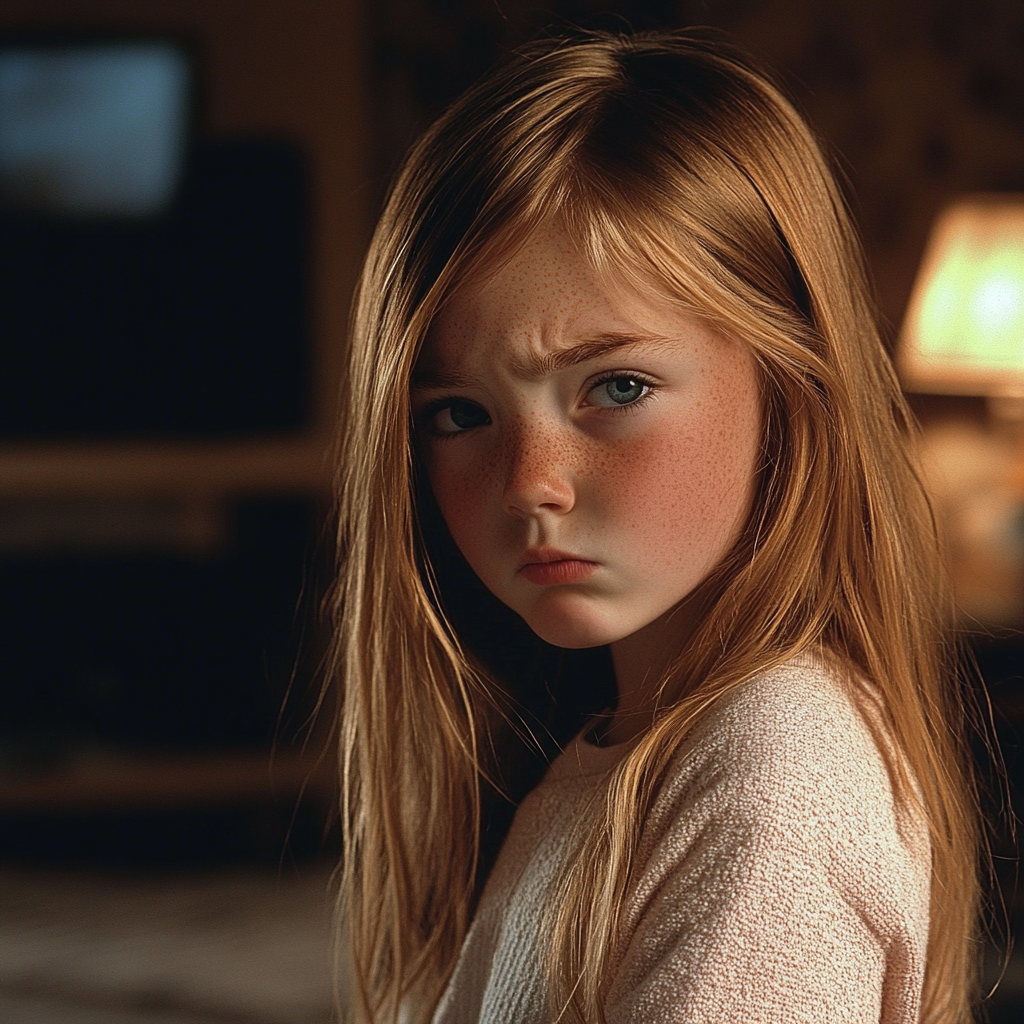
Uma garota carrancuda | Fonte: Midjourney
Lily manteve distância, sempre insistindo que tinha suas razões para não aceitar Mike. Essas razões permaneceram um mistério para mim, não importa o quanto eu tentasse descobri-las.
O dia em que tudo mudou começou como qualquer outro. Eu saí para o trabalho, Mike foi para o escritório dele e Lily pegou o ônibus para a escola.
Por volta do meio-dia, uma dor de cabeça terrível me forçou a sair do trabalho mais cedo. Enquanto dirigia para casa, imaginei a casa silenciosa e vazia me esperando… um lugar perfeito para deitar e me recuperar.

Uma mulher dirigindo um carro | Fonte: Unsplash
Mas quando entrei na garagem, notei algo estranho. O carro de Mike estava estacionado de qualquer jeito, como se ele estivesse com pressa. E não era a mochila de Lily na varanda?
Uma sensação de desconforto tomou conta de mim. Por que os dois estavam em casa? Aconteceu alguma coisa?
Aproximei-me da porta da frente, meu coração batendo forte. Estava ligeiramente entreaberta, e eu podia ouvir vozes abafadas de dentro. Respirando fundo, empurrei-a para abrir.

Uma porta aberta | Fonte: Unsplash
“Lily? Mike?”, gritei, mas não houve resposta.
A casa estava estranhamente silenciosa enquanto eu me movia pelo corredor. Mas então ouvi algo que fez meu sangue gelar. Gritos suaves vindos da sala de estar.
Minha mente correu com possibilidades, cada uma pior que a anterior. Eles estavam brigando? Lily tinha se machucado?
Senti meu peito apertar de ansiedade enquanto alcançava a porta da sala de estar. Empurrei-a para abrir, me preparando para o pior.
Mas o que vi me deixou sem fôlego.
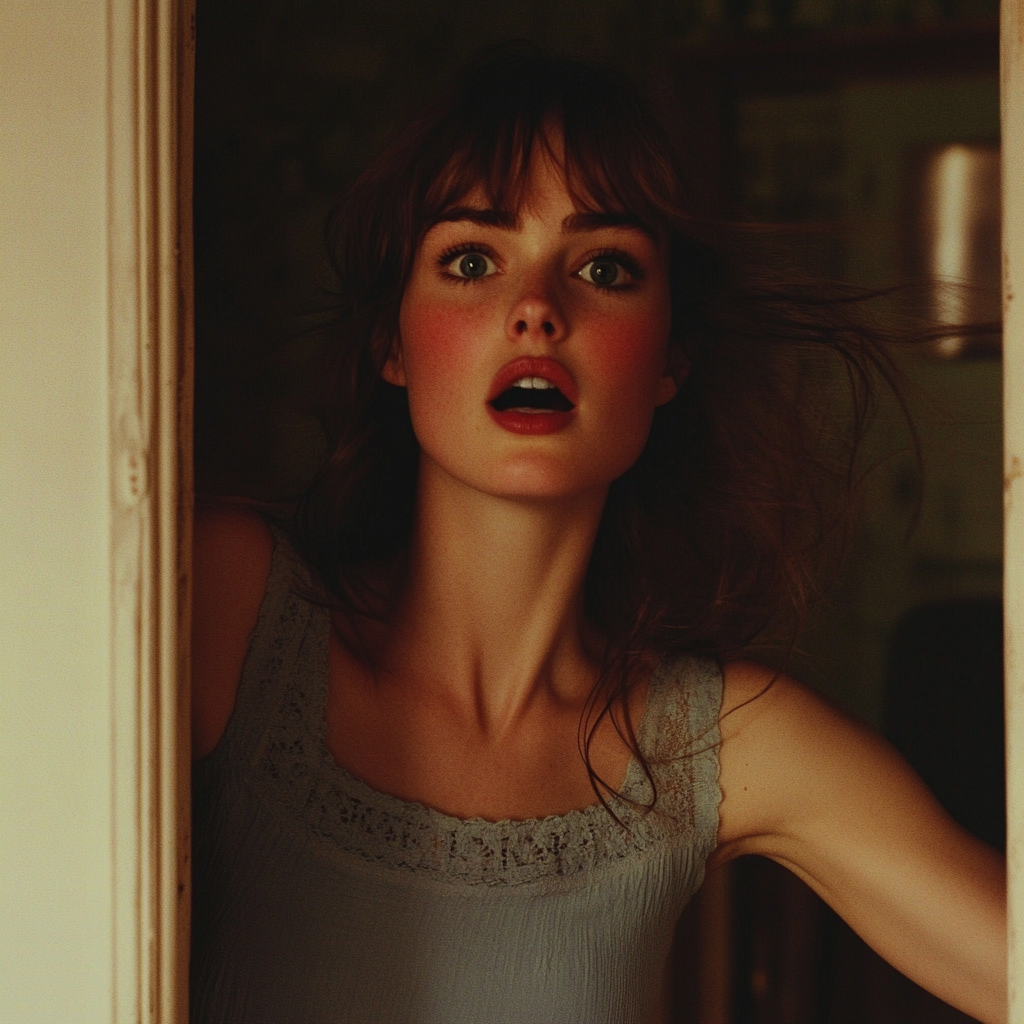
Uma mulher boquiaberta em choque | Fonte: Midjourney
Lily estava parada no meio da sala, usando um lindo vestido azul que fluía até o chão. Seu cabelo estava elegantemente penteado, tão diferente de seu rabo de cavalo casual de sempre.
E lá estava Mike, elegante em um terno que eu nunca tinha visto antes.
Os rostos de ambos estavam cobertos de lágrimas.
“Mãe!” Lily arfou, seus olhos arregalados de choque. “Você chegou cedo em casa!”
Entrei na sala, minha mente se esforçando para entender a cena diante de mim.
“O que está acontecendo aqui?”, eu suspirei.
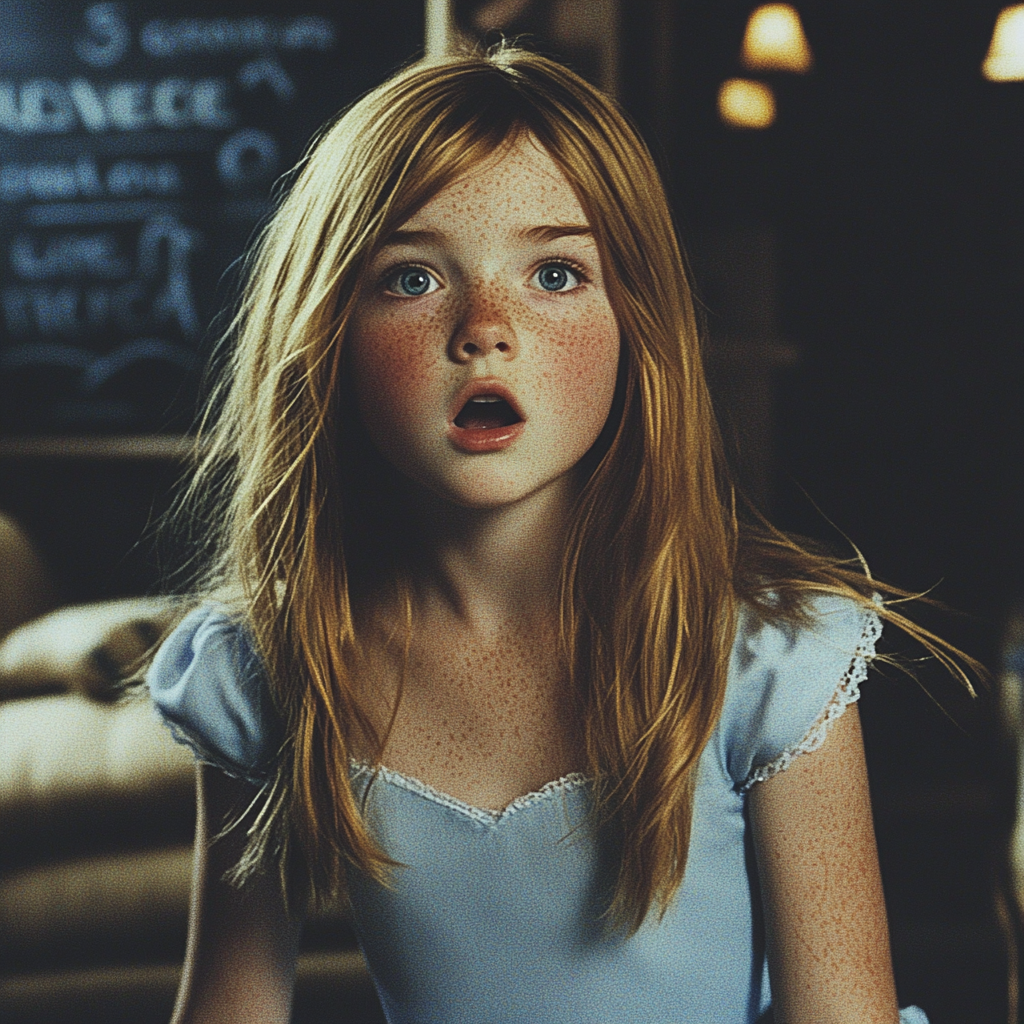
Uma garota assustada | Fonte: Midjourney
Mike se aproximou de mim, suas mãos estendidas em um gesto apaziguador. “Elizabeth, não é o que você pensa. Nós podemos explicar.”
Lily enxugou os olhos apressadamente, seu rosto corado. “Nós estávamos apenas… praticando,” ela deixou escapar.
“Praticando? Praticando para quê?”
Mike e Lily trocaram um olhar que não consegui decifrar. Então Mike respirou fundo e disse: “Para o baile de pai e filha na escola de Lily. Ela… ela me pediu para ir com ela.”
Eu senti como se o chão tivesse se movido sob meus pés. Depois de anos com Lily afastando Mike, isso parecia impossível.

Um homem sorrindo | Fonte: Midjourney
“Mas eu pensei…” Parei de falar, incapaz de terminar a frase.
O lábio inferior de Lily tremeu. “Sinto muito, mãe”, ela disse, com os olhos baixos. “Eu queria que fosse uma surpresa.”
Afundei na cadeira mais próxima, impressionado com a mudança repentina em tudo que eu achava que sabia.
“Não entendo”, eu disse, olhando entre Lily e Mike. “O que mudou?”

Uma mulher atordoada | Fonte: Midjourney
A compostura de Lily desmoronou. Ela correu até mim, caindo de joelhos ao lado da minha cadeira.
“Oh, mãe”, ela soluçou, “eu fui tão cega! Eu achava que odiava Mike, mas não entendia o quanto ele realmente me amava até… até que ele me salvou.”
Meu coração pulou uma batida. “Salvou você? O que você quer dizer, querida?”
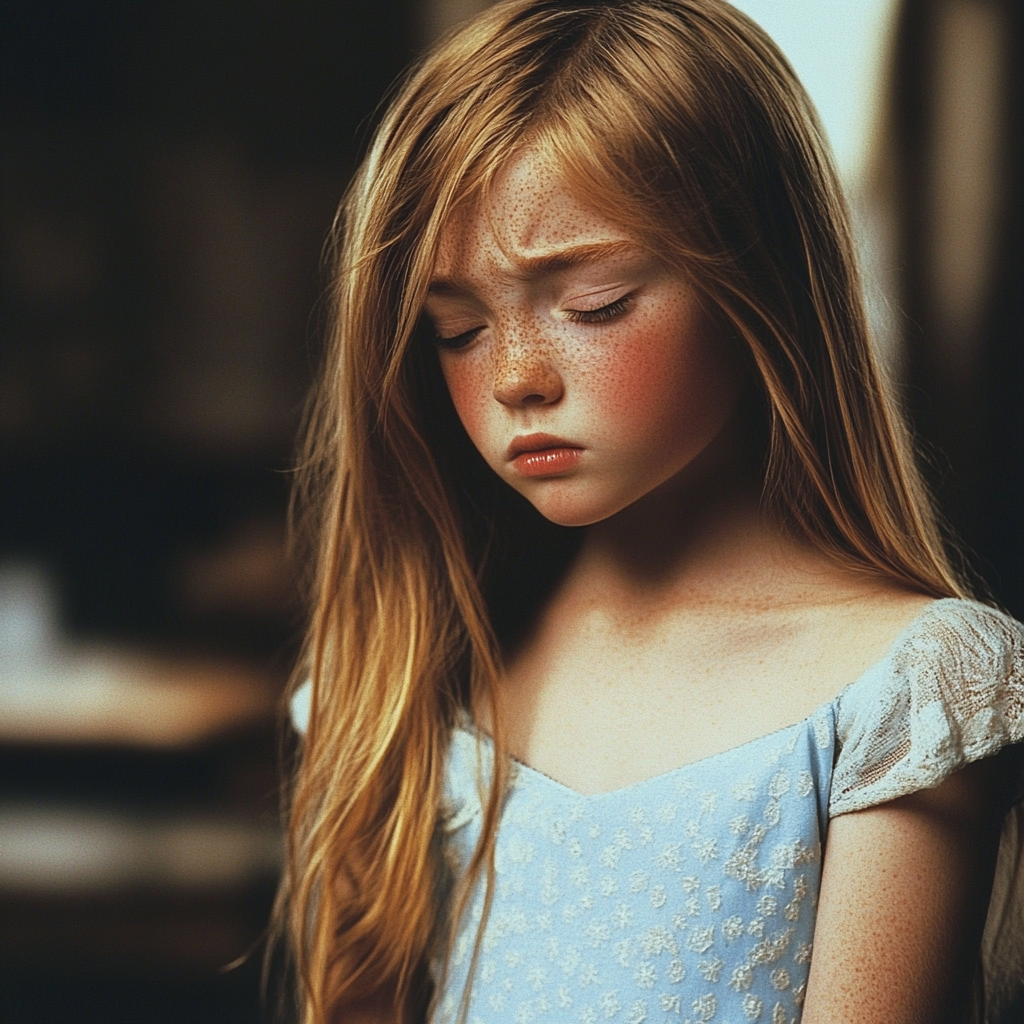
Uma menina triste com os olhos fechados | Fonte: Midjourney
Lily respirou fundo, trêmula, e seus olhos encontraram os de Mike por um momento antes de continuar.
“Semana passada, quando eu estava voltando da escola para casa, havia esses meninos mais velhos. Eles estavam me provocando, me empurrando. Eu estava com tanto medo, mãe. E então, de repente, Mike estava lá. Ele os enfrentou e os fez me deixar em paz. Ele era… ele era como um pai de verdade.”
Mike se aproximou, colocando uma mão gentil no ombro de Lily. “Eu não suportaria ver você machucada, Lily. Você significa o mundo para mim, mesmo quando me afasta.”

Um homem com os olhos baixos | Fonte: Midjourney
Senti lágrimas brotando em meus olhos enquanto os observava, percebendo o novo entendimento entre eles.
“Depois disso, percebi o quão estúpida eu fui. Mike não estava substituindo o papai. Ele sempre esteve lá por mim, e eu fui teimosa demais para perceber isso”, Lily concluiu.
“Oh, querida,” sussurrei, puxando-a para um abraço. “Por que você não me contou sobre isso antes?”
“Eu queria te surpreender. Te mostrar que… que nós poderíamos ser uma família de verdade. É por isso que estamos praticando para essa dança. Eu quero consertar as coisas.”

Uma mulher emocional | Fonte: Midjourney
Mike se ajoelhou ao nosso lado, colocando uma mão hesitante no ombro de Lily. “Lily, seu pai sempre será seu pai. Nada pode mudar isso. Não estou tentando substituí-lo. Eu só… eu só quero te amar, se você me deixar.”
Lily se virou para encarar Mike, seus olhos vermelhos. “Eu sei disso agora. E eu quero tentar. É por isso que eu te convidei para o baile. Eu pensei que talvez… talvez pudéssemos recomeçar?”
O rosto de Mike se iluminou com um sorriso tão brilhante que poderia ter alimentado a casa inteira. “Eu gostaria muito disso”, ele disse, abrindo os braços.

Um homem emocionado sorrindo | Fonte: Midjourney
Lily hesitou por apenas um momento antes de se jogar em seu abraço. Eu assisti, lágrimas escorrendo pelo meu rosto enquanto anos de tensão derretiam naquele único abraço.
Quando eles finalmente se separaram, ambos rindo e chorando ao mesmo tempo, eu encontrei minha voz novamente. “Então, essa dança”, eu disse, gesticulando para suas roupas. “Quando você estava planejando me contar sobre isso?”
Lily sorriu timidamente. “Queríamos surpreender você no evento real!”
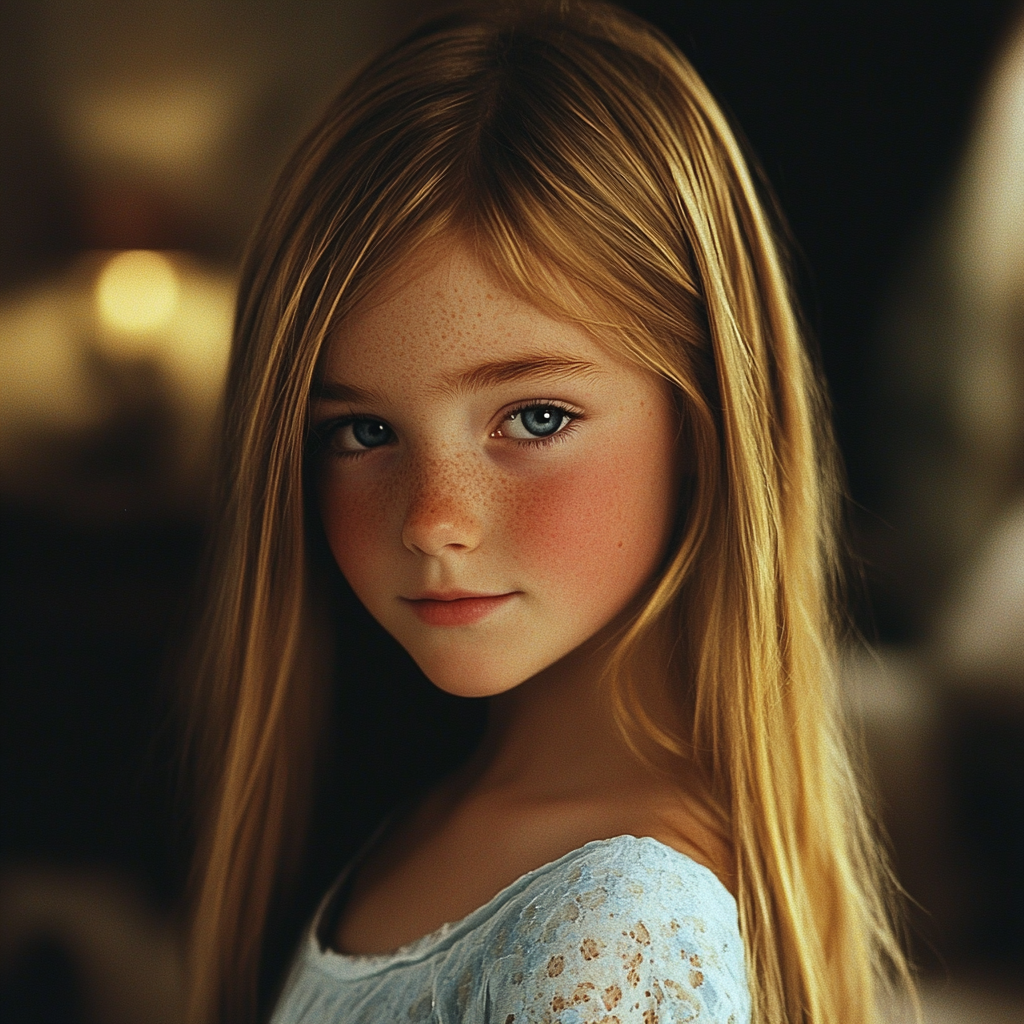
Uma menina sorrindo | Fonte: Midjourney
Mike limpou a garganta, ajeitando a gravata. “Bem, já que o gato saiu da bolsa, o que você acha de mostrarmos à sua mãe no que estamos trabalhando, Lily?”
Os olhos de Lily brilharam. “Sim! Mãe, você tem que ver nossa dança. Estamos praticando há dias!”
Recostei-me na cadeira, com um largo sorriso no rosto. “Eu não adoraria nada mais.”

Uma mulher com os olhos marejados | Fonte: Midjourney
Quando eles começaram a se movimentar pela sala, fiquei impressionado com o quão naturais eles pareciam juntos.
A mão de Mike pousou gentilmente nas costas de Lily, guiando-a pelos degraus. O rosto de Lily era uma imagem de concentração, sua língua ligeiramente para fora enquanto ela se concentrava em não pisar nos dedos de Mike.
“Um, dois, três… Um, dois, três…” Mike contou suavemente, guiando Lily por um simples passo de caixa.
“Estou fazendo certo?”, ela perguntou, olhando para ele ansiosamente.
O sorriso de Mike era caloroso e encorajador. “Você está indo muito bem, querida. Apenas relaxe e sinta a música.”
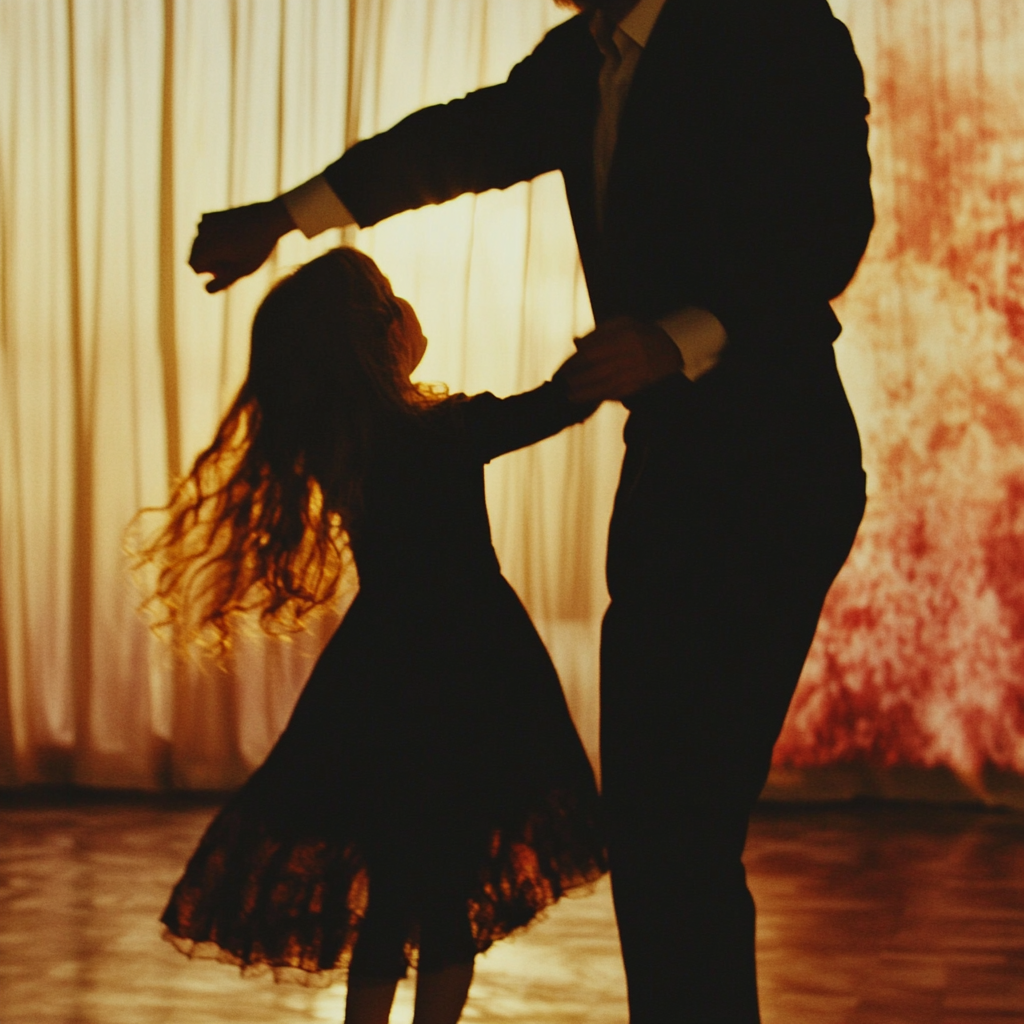
Um homem e uma jovem dançando | Fonte: Midjourney
Seus movimentos graciosos acalmavam minha alma. Isso era tudo que eu sempre quis para eles… essa companhia fácil, essa afeição mútua. Esse amor.
A música terminou, e Lily se separou de Mike com um floreio teatral. “Ta-da!” ela exclamou, respirando pesadamente, mas radiante de orgulho.
Bati palmas entusiasticamente, meu coração transbordando de amor por ambos. “Isso foi maravilhoso! Vocês dois formam um belo par.”

Uma mulher alegre batendo palmas | Fonte: Midjourney
Eu sabia que tudo ficaria bem quando olhei para os rostos sorridentes de Mike e Lily. Tínhamos virado uma esquina, e embora eu tivesse certeza de que ainda haveria desafios pela frente, nós os enfrentaríamos juntos como uma família.
No final, o baile não foi apenas um evento escolar; foi uma celebração do amor, da aceitação e da beleza das segundas chances.
Ao abraçar minha filha e meu marido, senti uma esperança avassaladora por nossa família. Juntos, estávamos aprendendo que o amor pode curar até as feridas mais profundas, e que família não é só sobre sangue; é sobre os laços que escolhemos nutrir e o amor que escolhemos dar.

Uma mulher encantada sorrindo | Fonte: Midjourney
Aqui vai outra história : Um único vídeo de câmera escondida da secretária do meu marido afundou meu coração. Eu queria que tivesse sido um caso. Mas o que eu vi foi muito mais devastador.
Este trabalho é inspirado em eventos e pessoas reais, mas foi ficcionalizado para fins criativos. Nomes, personagens e detalhes foram alterados para proteger a privacidade e melhorar a narrativa. Qualquer semelhança com pessoas reais, vivas ou mortas, ou eventos reais é mera coincidência e não intencional do autor.
O autor e a editora não fazem nenhuma reivindicação quanto à precisão dos eventos ou à representação dos personagens e não são responsáveis por nenhuma interpretação errônea. Esta história é fornecida “como está”, e quaisquer opiniões expressas são as dos personagens e não refletem as opiniões do autor ou da editora.
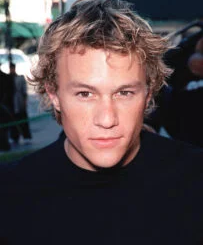

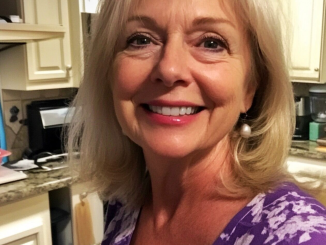
Leave a Reply